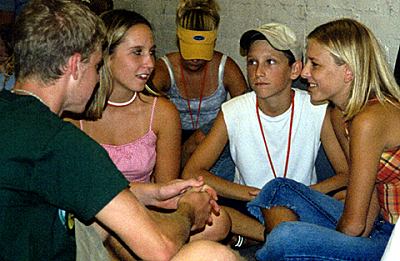Youth, young adult ministries revamp
|

|
|
Photo Courtesy of Florida United Methodist Communications |
Florida Conference youth will soon be discussing spiritual matters
at more local gatherings. The Florida Conference Youth Ministry Team
believes some youth training events, like the Real Luv faith and human
sexuality weekend, could be done better on a district or regional level. |
By Michael Wacht
LAKELAND — The Florida Conference Youth and
Young Adult ministry teams have decided to discontinue two key
ministry events, while looking for ways to build a new community among
the conference’s diverse young adult population.
Mike Standifer, director of the Florida
Conference Council on Ministries’ (CCOM) Youth and Young Adult
ministries office, said the changes are a result of listening to local
churches and praying for a new direction for the conference’s
ministry to young people.
Standifer held nine regional listening posts
last March. He invited youth ministers, coordinators and volunteers to
attend and share their vision for youth ministry. The listening
sessions were followed by a prayer retreat and the Spring Training
Event for youth ministers.
The process led to clarity about God’s
direction for the ministry and the needs of local church youth
ministers, Standifer said. The four needs most often expressed were
communication, encouragement, networking, and training and spiritual
development.
Participants at the Spring Training Event
divided into four design teams to discuss ways the ministry area is
currently meeting each area of need, what should continue and what is
not needed. They also brainstormed new ideas.
“All of that is in process still,” Standifer
said. “There are no final products.”
Ministry team members did decide to discontinue
the conference youth event and Real Luv Weekend. Feedback showed most
people felt the youth event, which has included concerts, worship and
activities at a theme park, was not worth the time or money. Youth
ministers also felt the Real Luv faith and human sexuality training
could be done better at district or regional training events with
assistance from the conference.
“I feel good about the fact that we had just
over 100 people at each of the nine listening posts who really shared
what the needs are in the local church,” he said. “And we’re
moving in the right direction based on those needs.”
Young adults need new community
While the youth ministry team is moving with
certainty in new directions, ministry to young adults is presenting
some challenges that require unique solutions, according to Standifer.
“If you’re in middle school or high school…there’s
programming geared toward you. After that, young adults kind of seem
to get lost,” he said.
The Rev. Meredith McMillan, pastor of Golden
Gate United Methodist Church in Golden Gate and chairwoman of the CCOM’s
Young Adult Ministry team, said there is “a void when it comes to
young adults active in the church.”
“Some churches are doing good and strong
ministries for young adults,” she said. “But other than the good
work we’re doing on college campuses, there’s very little for
young adults.”
Standifer said the young adult category is very
broad. The United Methodist Book of Discipline defines a young adult
as someone between 18 and 30 years old. The Florida Conference
stretches that definition to people in their late 30s. That age range
encompasses people in a number of life stages that vary significantly.
Standifer says such diversity makes it nearly
impossible to design a program that will reach everyone effectively.
One ministry solution the team has developed is
an on-line community specifically for young adults through an Internet
Web site. The site’s address is http://www.searching7.com, and it
features a chat room, message boards and resources to help young
adults and churches trying to reach young adults.
McMillan says the site meets several goals. “We
want to support those young adults still hanging on in the local
churches and find ways to help them connect with each other and
empower them to create a ministry and space for themselves,” she
said. “It will also help local churches open their doors truly to
those in between youth and middle age.”
The Web site helps young adults network and find
resources and churches learn about successful ministries.
McMillan says creating a new church community in
cyberspace also helps expand everyone’s understanding of what the
church is and can be.
“It’s outside the bounds of what we
understand as inside the church, which traditionally means inside of a
building, but technology allows us to expand that definition,” she
said. “Communication on the message board, that’s the church. It’s
not a tangible building, but if it happens in the spirit of who we are
as United Methodists, it’s not outside the church, it’s just
outside how we’ve been living the church to this point.”
|